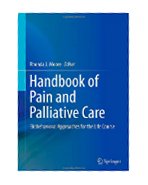Handbook of Pain and Palliative Care

Author: Rhonda Moore
Affiliation: Department of Health and Human Services; Rockville, MD
Publisher: Springer Nature
Publication Date: 2012
ISBN 10: 1441916504
ISBN 13: 9781441916501
eISBN: 9781441916518
Edition: 1st
Affiliation: Department of Health and Human Services; Rockville, MD
Publisher: Springer Nature
Publication Date: 2012
ISBN 10: 1441916504
ISBN 13: 9781441916501
eISBN: 9781441916518
Edition: 1st
Description:
Takes unprecedented multidisciplinary approach to understanding the effective evaluation and management of pain across the life process in the context of palliative care. Includes expert research from the fields of genetics, biology, psychology, anthropology, neurology, oncology, substance abuse and pharmacology, pharmacoeconomics, gerontology, pediatrics, health services research, rehabilitative medicine, palliative care, and public policy. Pain has long been regarded as an unpleasant sensory consequence of neuronal activity in specific nociceptive pathways that is triggered by noxious stimuli, inflammation, or damage to the nervous system structure or function. However, classic models of disease and pain mechanisms do not adequately explain the commonly observed discrepancies between the extent of pathology levels of reported pain, the impact of experience of illness, disability, or in certain instances death, on the lived experience of pain. In other words, pain is not only a sensory event but a biobehavioral event as well. As such, it is subjective and therefore a significant cause of psychological suffering and even existential questioning. Thus treatment for many chronic pain syndromes, early in life, over the life course, and certainly at the end of life, remains an inexact science. Recent studies over the past decade have begun to explore a biobehavioral approach, one that considers the interactive role of biological, environmental, emotional, existential, and psychosocial processes that can adversely impact the development, course, and experience of illness and disease over the life course. Illness is defined as the subjective experience of a disease or disorder. In contrast, disease is defined as an objective biological event involving the disruption of specific body structures or organ systems. The central goal of palliative care is to prevent and relieve suffering and to enable the best quality of life possible for patie.
Related Titles
